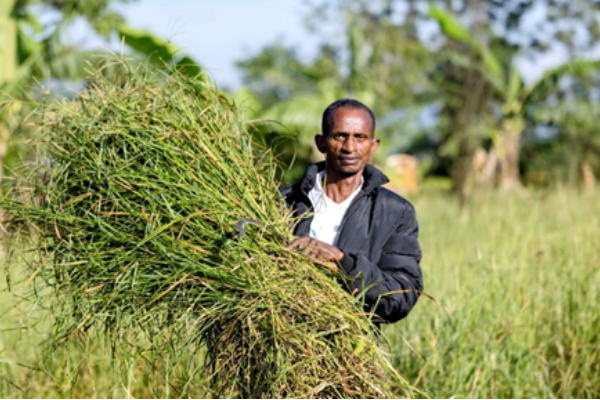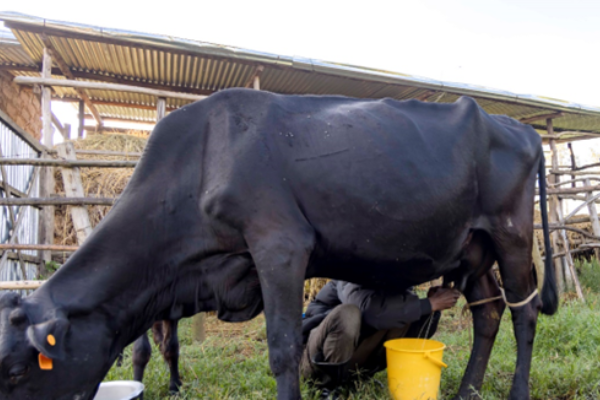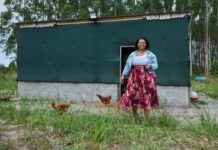
A Rwandan dairy farmer has increased his annual earnings from RWF 540,000 to RWF 2,160,000 by embracing modern farming techniques that have boosted milk yield and quality.
Elias Mugabowakigeli, aged 61 years, started rearing traditional cattle, a skill he inherited from his family. Like many farmers in Rwanda’s rural areas, he depended on local breeds grazing freely on natural pastures.
The milk yield was low, often inconsistent, and earnings barely covered household needs. His cows produced little milk during the dry season, when feed was scarce, forcing him to rely on meagre incomes from other sources.
In a publication by the Food and Agriculture Organization (FAO), under the DeSIRA – Farmer Field School (FFS) initiative, Elias’s journey from traditional to modern dairy farming is highlighted as a success story of how learning and innovation can transform livelihoods.
Implemented in collaboration with the Rwanda Agriculture and Animal Resources Development Board (RAB) and other partners, the DeSIRA-FFS project trains farmers to improve livestock productivity through practical, hands-on learning sessions conducted within their own communities.
“Because of what I learned from DeSIRA, I am not only producing more milk but producing better milk,” the father of four told FAO. “Before, my cows produced around 16 to 18 litres of milk per day, but now I get up to 35 litres even in the dry season.”
His increased production has allowed him to supply the local dairy cooperative more consistently, earning a reliable monthly income. Elias credits the training for teaching him how to feed and care for his cattle better, manage pasture efficiently, and maintain hygiene to ensure milk quality meets cooperative standards.
According to the global food organization, the key to his transformation lay in adopting modern farming techniques promoted through the Farmer Field School approach.
These included improved livestock management, the use of high-yielding and disease-resistant dairy breeds, introduction of planted pastures such as Napier grass and Brachiaria, and proper formulation of balanced feed rations using crop residues, legumes, and cereal by-products.
Training also covered animal health management, record-keeping, and milk handling practices that ensure quality and reduce post-harvest losses.
Through these interventions, Elias has been able to feed his cows throughout the year, even during the dry season when pasture is scarce.
He now stores silage and hay, practices zero-grazing, and ensures his cows receive mineral supplements regularly. As a result, his cows remain healthy and productive all year round.
“The cows no longer lose weight or reduce milk production during dry months,” he said. “That means I can sell milk every day and plan my income better.”
The results are remarkable. His income from milk sales has risen fourfold — from about RWF 45,000 per month (USD 36) to RWF 180,000 per month. With increased income, Elias has invested in a proper house, a motorcycle, improved breeds of cows, and pasture fields.
This has allowed him to improve his family’s living conditions, pay school fees for his children, and reinvest in his farm by constructing a modern cowshed and purchasing better feed storage facilities.

FAO reports that hundreds of other farmers across Rwanda have benefited from the same initiative, gaining practical skills in sustainable dairy production.
The DeSIRA project, funded by the European Union, aims to strengthen climate-smart innovation systems and make smallholder farmers more resilient to challenges such as feed scarcity, animal diseases, and changing weather patterns.
The Farmer Field School model emphasizes collective learning, where farmers share knowledge and test improved practices together before adopting them individually. This participatory approach ensures that farmers like Elias understand not just what to do, but why it works — building confidence and long-term sustainability.
Elias’ success story demonstrates how simple but science-based practices can dramatically increase productivity and income in the dairy sector.
By embracing modern techniques, he has turned what was once a subsistence activity into a profitable business. As Rwanda continues to invest in agricultural innovation and farmer training, stories like his are inspiring evidence of how knowledge can transform lives — one dairy farmer at a time.







